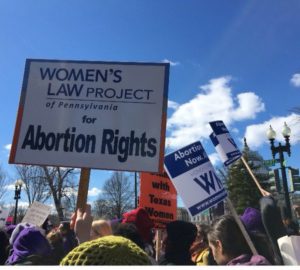
Women’s Law Project outside the U.S. Supreme Court in 2016 on the day Hellerstedt was decided.
On Friday morning, the U.S. Supreme Court agreed to hear June Medical Services v. Gee, the first abortion case of the term.
June Medical Services v. Gee concerns an admitting privileges law signed into law by Louisiana Gov. Bobby Jindal in 2014. It is, of course, the first abortion case since Trump appointed Justices Brett Kavanaugh and Neil Gorsuch to the bench.
“The Supreme Court determined that admitting privileges laws were a sham that burdened access to safe legal abortion and had no public health benefit in Whole Woman’s Health v. Hellerstedt,” says Women’s Law Project Executive Director Carol E. Tracy. “Three years later, admitting privileges are still medically unnecessary and still cause undue burden. What’s changed is the composition of the bench.”
If you recall, Whole Woman’s Health v. Hellerstedt ruled that two Texas laws, admitting privileges and surgical center requirements, were unconstitutional.
From the Hellerstedt opinion authored by Justice Breyer:
We conclude that neither of these provisions confers medical benefits sufficient to justify the burdens upon access that each imposes. Each places a substantial obstacle in the path of women seeking a previability abortion, each constitutes an undue burden on abortion access, Casey, supra, at 878, 112 S.Ct. 2791 (plurality opinion), and each violates the Federal Constitution.
Because of this clear precedent, other states attempting to pass and justify similar legislation, such as Alabama, dropped their efforts to pass an admitting privileges law.
Despite this clear precedent, the 5th Circuit Court of Appeals reversed the district court ruling and upheld the Louisiana admitting privileges law when challenged by abortion providers.
Seasoned court-watcher and writer Linda Greenhouse characterized that decision as “a stunning act of judicial defiance” and noted that the Hellerstedt opinion explicitly rebuked the 5th Circuit for failing to adequately scrutinize the law when they upheld admitting privileges.
Justice Breyer also made it a point to note that “when directly asked at oral argument whether Texas knew of a single instance in which the new requirement would have helped even one woman obtain better treatment, Texas admitted that there was no evidence in the record of such a case.”
Nonetheless, the 5th Circuit once again upheld an identical law three years later.
Understandably, Louisiana abortion providers asked that the law not take effect until and unless re-addressed by a higher court. In February, the Supreme Court granted that request. However, Justices Thomas, Alito, Gorsuch, and Kavanaugh dissented from the majority in an opinion authored by Kavanaugh.
June Medical Services v. Gee can be argued as early as this fall, with an opinion likely in 2020.
Meanwhile, the fallout in Texas from the attempt to pass this sham abortion restriction can be seen as a study in how anti-choice activists can force abortion providers to close their doors even when the abortion restrictions they’re promoting are unconstitutional. Even a victorious ruling out of the highest court cannot undo damage already done on the ground. Before the Hellerstedt ruling, about half the 41 clinics in Texas were forced to close, and not all of them re-opened. To date, the number of abortion providers has not been more than 25 since the ruling.
Of course, every time an unconstitutional abortion restriction is struck down, the taxpayers get stuck with the bill for the winners’ attorneys’ fees.
What can you do? It’s more important than ever to join the fight on the state level to protect our reproductive rights, health, and justice. Send this sign-up link for Action Alerts to a friend. Urge them to get involved. Our state lawmakers are back in session, and we need all the voices we can get to pass proactive bills and defend ourselves from unconstitutional restrictions, such as the six-week abortion restriction we expect to see in Pennsylvania in the near future.
And stay tuned.
The Women’s Law Project is a public interest law center devoted to defending and expanding the rights of women, girls, and LGBTQ people in Pennsylvania and beyond.
Sign up for WLP’s Action Alerts. Stay up to date on issues and policy by following us on twitter liking us on Facebook and following us on Instagram.
We are a non-profit organization. Please consider supporting equal rights for women and girls by making a one-time donation or scheduling a monthly contribution.


